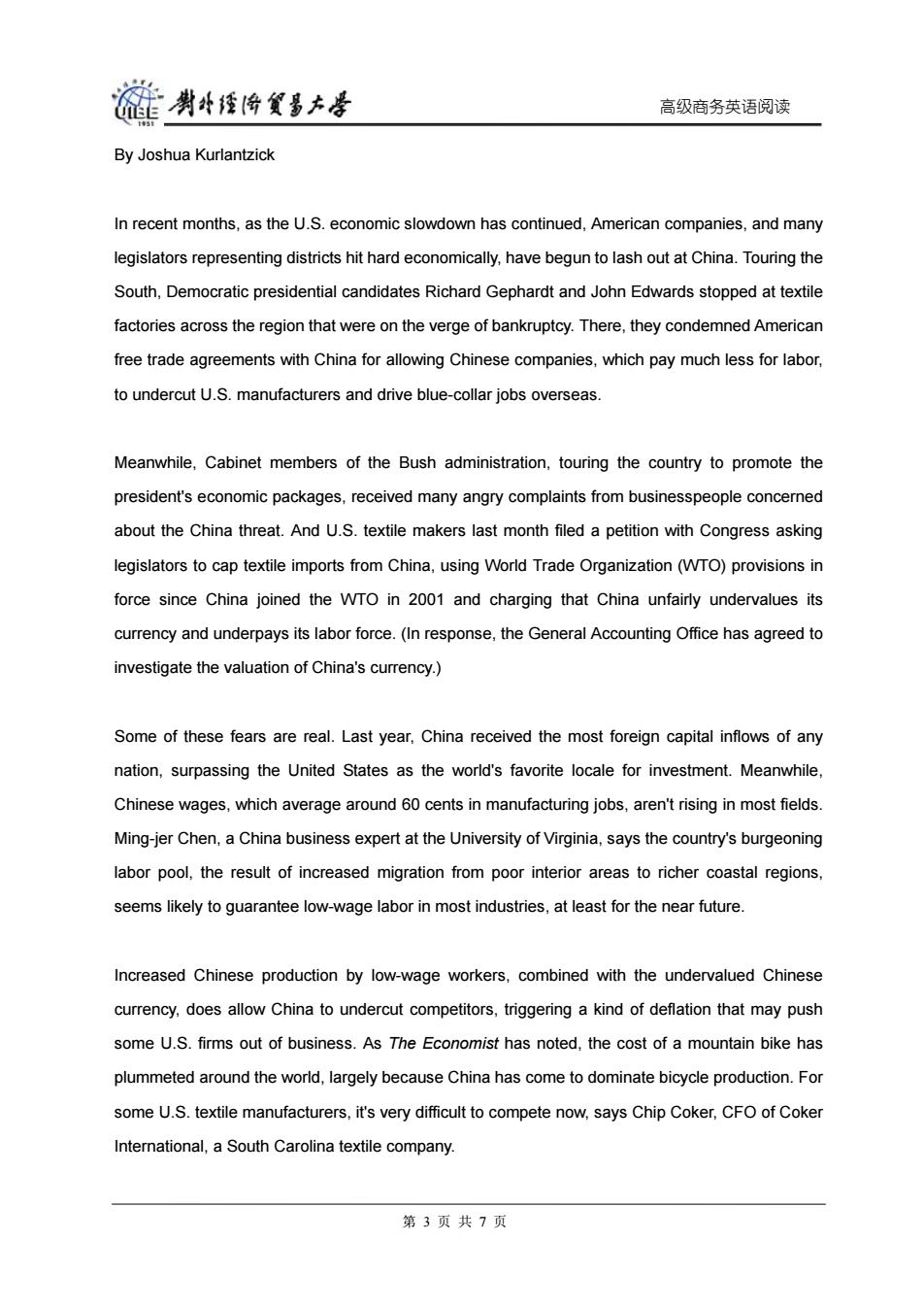正在加载图片...

碰男华经海贸多大学 高级商务英语阅读 By Joshua Kurlantzick In recent months,as the U.S.economic slowdown has continued,American companies,and many legislators representing districts hit hard economically,have begun to lash out at China.Touring the South,Democratic presidential candidates Richard Gephardt and John Edwards stopped at textile factories across the region that were on the verge of bankruptcy.There,they condemned American free trade agreements with China for allowing Chinese companies,which pay much less for labor, to undercut U.S.manufacturers and drive blue-collar jobs overseas. Meanwhile,Cabinet members of the Bush administration,touring the country to promote the president's economic packages,received many angry complaints from businesspeople concerned about the China threat.And U.S.textile makers last month filed a petition with Congress asking legislators to cap textile imports from China,using World Trade Organization (WTO)provisions in force since China joined the WTO in 2001 and charging that China unfairly undervalues its currency and underpays its labor force.(In response,the General Accounting Office has agreed to investigate the valuation of China's currency.) Some of these fears are real.Last year,China received the most foreign capital inflows of any nation,surpassing the United States as the world's favorite locale for investment.Meanwhile, Chinese wages,which average around 60 cents in manufacturing jobs,aren't rising in most fields. Ming-jer Chen,a China business expert at the University of Virginia,says the country's burgeoning labor pool,the result of increased migration from poor interior areas to richer coastal regions, seems likely to guarantee low-wage labor in most industries,at least for the near future. Increased Chinese production by low-wage workers,combined with the undervalued Chinese currency,does allow China to undercut competitors,triggering a kind of deflation that may push some U.S.firms out of business.As The Economist has noted,the cost of a mountain bike has plummeted around the world,largely because China has come to dominate bicycle production.For some U.S.textile manufacturers,it's very difficult to compete now,says Chip Coker,CFO of Coker International,a South Carolina textile company. 第3页共7页高级商务英语阅读 By Joshua Kurlantzick In recent months, as the U.S. economic slowdown has continued, American companies, and many legislators representing districts hit hard economically, have begun to lash out at China. Touring the South, Democratic presidential candidates Richard Gephardt and John Edwards stopped at textile factories across the region that were on the verge of bankruptcy. There, they condemned American free trade agreements with China for allowing Chinese companies, which pay much less for labor, to undercut U.S. manufacturers and drive blue-collar jobs overseas. Meanwhile, Cabinet members of the Bush administration, touring the country to promote the president's economic packages, received many angry complaints from businesspeople concerned about the China threat. And U.S. textile makers last month filed a petition with Congress asking legislators to cap textile imports from China, using World Trade Organization (WTO) provisions in force since China joined the WTO in 2001 and charging that China unfairly undervalues its currency and underpays its labor force. (In response, the General Accounting Office has agreed to investigate the valuation of China's currency.) Some of these fears are real. Last year, China received the most foreign capital inflows of any nation, surpassing the United States as the world's favorite locale for investment. Meanwhile, Chinese wages, which average around 60 cents in manufacturing jobs, aren't rising in most fields. Ming-jer Chen, a China business expert at the University of Virginia, says the country's burgeoning labor pool, the result of increased migration from poor interior areas to richer coastal regions, seems likely to guarantee low-wage labor in most industries, at least for the near future. Increased Chinese production by low-wage workers, combined with the undervalued Chinese currency, does allow China to undercut competitors, triggering a kind of deflation that may push some U.S. firms out of business. As The Economist has noted, the cost of a mountain bike has plummeted around the world, largely because China has come to dominate bicycle production. For some U.S. textile manufacturers, it's very difficult to compete now, says Chip Coker, CFO of Coker International, a South Carolina textile company. 第 3 页 共 7 页